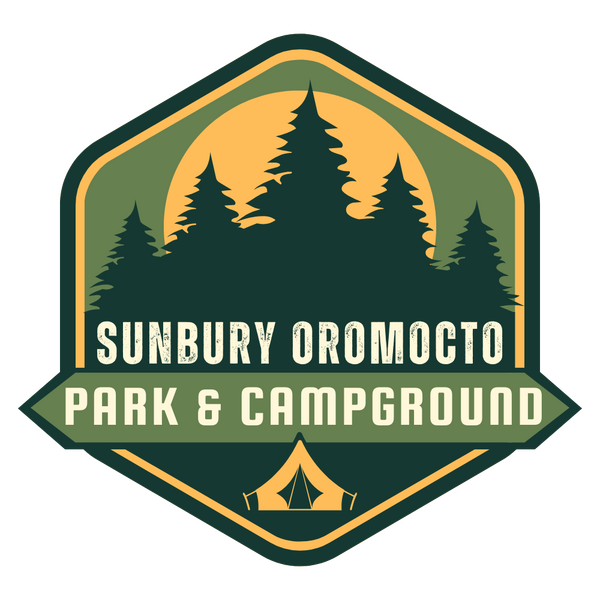Picture this: You wake up to the sound of birds instead of your alarm, stretch out of your tent (or camper, because let’s be real, not everyone is about that tent life), and breathe in that fresh lakeside air. No emails. No traffic. Just you, nature, and maybe a stack of pancakes cooking over the fire.
Feels pretty good, right? Well, science says it’s actually amazing for you. Camping isn’t just about s’mores and campfire stories—it’s a full-on wellness boost for your mind and body. Here’s why packing up and heading on over to spend time with US at Sunbury Oromocto Park is the best thing you can do for yourself.
1. Camping Literally Resets Your Brain 🧠
Ever feel like your brain is running a marathon you didn’t sign up for? That’s because constant screen time, artificial lighting, and the never-ending to-do list mess with your body’s natural rhythm. Studies show that spending just a few days outside—away from screens and city lights—helps reset your internal clock, improving sleep and reducing stress.
Translation? Sleeping under the stars at Sunbury Oromocto Park might be the best thing you do for your body’s natural rhythm. Bonus: No 3 AM doom-scrolling.
2. Boosts Your Mood—Like, a Lot 🌞
Spending time outdoors has been linked to lower levels of anxiety and depression in studies over and over again. Nature therapy (yes, that’s a real thing) has been shown to increase serotonin and dopamine levels—the feel-good chemicals in your brain. Even just looking at a lake or trees can reduce stress!
So if you needed another reason to book that lakeside camping trip in Oromocto, here it is: science literally says it’ll make you happier.
3. It’s Basically a Gym Disguised as Fun 🏃♀️🏕️
Hiking trails, kayaking, swimming, setting up your tent—camping sneaks in a workout without making you feel like you’re at the gym. A study from the American Journal of Lifestyle Medicine found that outdoor activities improve heart health, endurance, and even balance. And let’s be honest, playing a round of washer toss or soccer darts at the campground beats another boring treadmill session any day!
4. Camping Strengthens Relationships ❤️
When was the last time you had an actual conversation without someone checking their phone every five minutes? Camping forces us to unplug and actually connect with people. Whether it’s roasting marshmallows, paddling across the lake, casting a line with your little one, or competing in a heated game of jumbo Connect Four with your best friends, these shared experiences create stronger bonds.
So, next time you’re trying to plan a group trip, skip the hotel and opt for a tent, camper, or cabin instead. Your friendships (and sanity) will thank you.
5. You’ll Sleep Like a Baby (For Real This Time) 😴
If counting sheep or sleeping pills just aren't doing it for you, try counting stars instead. Research shows that exposure to natural light during the day and total darkness at night helps regulate melatonin levels, leading to better sleep.
Long story short: Swap out your sound machine for actual crickets chirping, and get the best sleep of your life.
Final Thought: Send This to That Friend Who Needs Convincing
We all know that person—the one who says they “don’t do camping” or keeps saying they will go with you and then never pulls the trigger…Well, now you have science-backed proof that they should. Send this their way and start planning your next camping trip with us. Whether it’s the mental health boost, the lakeside sunsets, or just an excuse to eat s’mores guilt-free, there’s no better place to recharge than in the great outdoors!
And if you’re still looking for the perfect spot? Sunbury Oromocto Park has the beach, park, trails, campfire-ready sites, and people who CARE, all waiting for you! See you out here! 🌲🔥
References:
-
Berman, M. G., Jonides, J., & Kaplan, S. (2012). The cognitive benefits of interacting with nature. Psychological Science, 19(12), 1207–1212.
-
Figueiro, M. G., Plitnick, B., Lok, A., Jones, G. E., Higgins, P., Hornick, T., & Rea, M. S. (2017). Tailored lighting intervention for persons with dementia and caregivers living at home. Sleep Health, 3(4), 221–228.
-
Hartig, T., Mitchell, R., de Vries, S., & Frumkin, H. (2014). Nature and health. Annual Review of Public Health, 35(1), 207–228.
-
Pretty, J., Peacock, J., Sellens, M., & Griffin, M. (2005). The mental and physical health outcomes of green exercise. International Journal of Environmental Health Research, 15(5), 319–337.
-
Wright, K. P., McHill, A. W., Birks, B. R., Griffin, B. R., Rusterholz, T., & Chinoy, E. D. (2013). Entrainment of the human circadian clock to the natural light-dark cycle. Current Biology, 23(16), 1554–1558.

